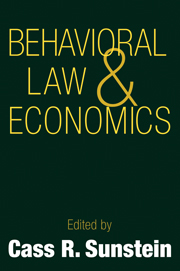Book contents
- Frontmatter
- Contents
- Contributors
- Acknowledgments
- Introduction
- Part I Overview and Prospects
- Part II Heuristics and Biases: Shortcuts, Errors, and Legal Decisions
- Part III Valuation: Values and Dollars in the Legal System
- 8 Experimental Tests of the Endowment Effect and the Coase Theorem
- 9 Assessing Punitive Damages (With Notes on Cognition and Valuation in Law)
- 10 Framing the Jury: Cognitive Perspective on Pain and Suffering Awards
- 11 Behavioral Economic Analysis of Redistributive Legal Rules
- 12 Do Parties to Nuisance Cases Bargain After Judgment? A Glimpse Inside the Cathedral
- Part IV The Demand for Law: Why Law Is As It Is
- Index
11 - Behavioral Economic Analysis of Redistributive Legal Rules
Published online by Cambridge University Press: 05 June 2012
- Frontmatter
- Contents
- Contributors
- Acknowledgments
- Introduction
- Part I Overview and Prospects
- Part II Heuristics and Biases: Shortcuts, Errors, and Legal Decisions
- Part III Valuation: Values and Dollars in the Legal System
- 8 Experimental Tests of the Endowment Effect and the Coase Theorem
- 9 Assessing Punitive Damages (With Notes on Cognition and Valuation in Law)
- 10 Framing the Jury: Cognitive Perspective on Pain and Suffering Awards
- 11 Behavioral Economic Analysis of Redistributive Legal Rules
- 12 Do Parties to Nuisance Cases Bargain After Judgment? A Glimpse Inside the Cathedral
- Part IV The Demand for Law: Why Law Is As It Is
- Index
Summary
This chapter offers a behavioral economic analysis of redistributive legal rules. Redistributive legal rules are rules chosen for their effects in shifting wealth from high-income to low-income individuals (progressive redistribution). The desirability of such rules has been the subject of intense debate within the legal community. Many law and economics scholars have urged that legal rules be chosen solely with an eye toward Kaldor-Hicks efficiency (which I will call simply “efficiency” for the remainder of this chapter); these scholars often urge that distributional considerations be addressed (if they are to be addressed at all) exclusively through the tax and welfare systems. On this view, distributive goals do not provide a basis for choosing an inefficient legal rule – although they might, it seems, provide a basis for choosing between two efficient rules. Other legal scholars have argued that the selection of legal rules should be informed by distributional considerations even at the expense of efficiency. I will call a rule “redistributive” if it makes such a trade-off between distributive objectives and efficiency.
A recurring theme in the debate over redistributive legal rules has been the relative cost of redistributing wealth through legal rules (defined to mean rules other than those that directly relate to the tax and welfare systems) and redistributing wealth through the tax and welfare systems (which I will call simply “the tax system” or “taxes” for the remainder of this chapter).
- Type
- Chapter
- Information
- Behavioral Law and Economics , pp. 288 - 301Publisher: Cambridge University PressPrint publication year: 2000
- 22
- Cited by



